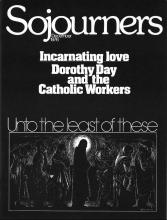St. Joseph’s House in New York is based on systematic unselfishness. It is one of the 50 houses of hospitality which have been generated by the Catholic Worker movement across the continent.
Each day 200 to 300 destitute people from the Bowery area of New York City find at St. Joseph’s House not only a warm meal but an atmosphere of unconditional acceptance.
Since its inception, engaging in these “works of mercy” has been central to the Catholic Worker movement. Serving the hungry, the homeless, and the hopeless provides both the lens for viewing society’s structural oppression and builds what Peter Maurin called “cells of good living,” rooted in the simple truths of the gospel.
The Catholic Worker volunteers believe that the way that one shares and gives is far more important than the actual ladles of soup or slices of bread. “It is not just the giving of things,” one volunteer said, “but of ourselves. That is what we most can give.”
A few blocks from St. Joseph’s House is a municipal shelter run by New York City for feeding and providing beds to destitute men. So the food served at St. Joseph’s House is seldom the difference between eating or not. Most come to this crowded soup kitchen for another reason. It is a place where no questions are asked, no prayers are required, no conversions are eagerly anticipated, where nothing is demanded.
The municipal shelter operates very efficiently, but it is described as a “real jungle.” Its dehumanizing atmosphere is the common result when works of mercy become the duty of governmental bureaucracies. The shelter carries out a necessary function rather than a ministry.
Read the Full Article

